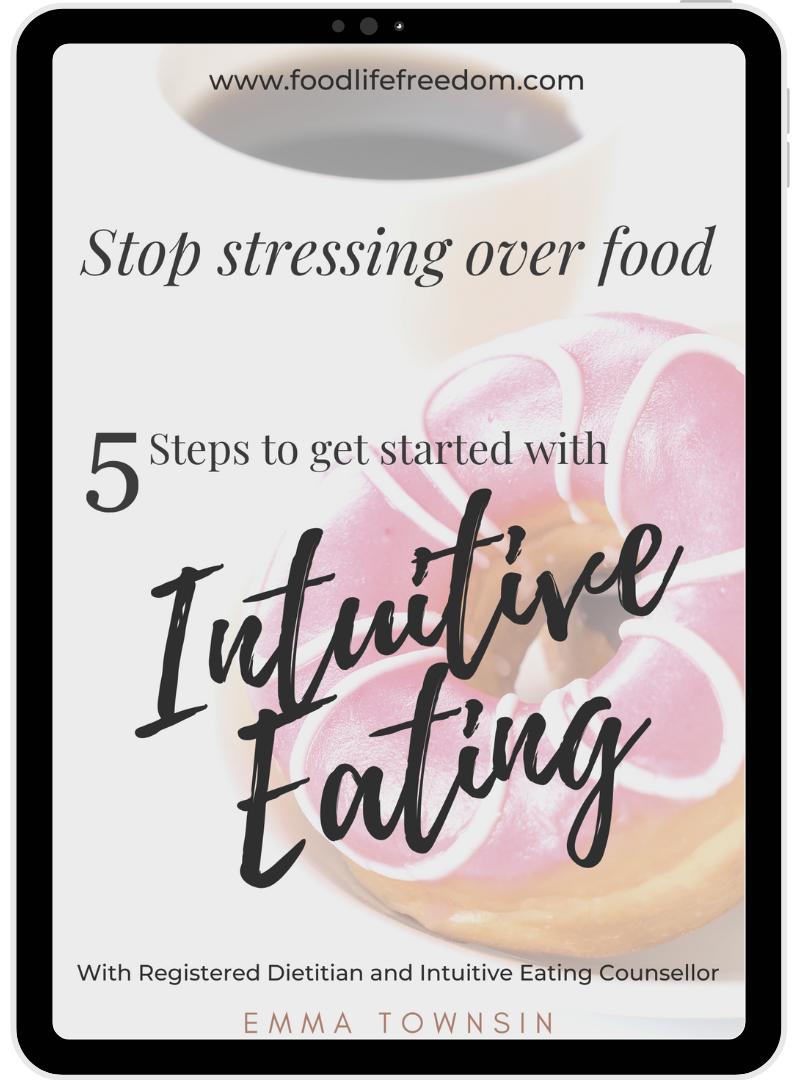The problem with weight loss dieting for "health". And healthy behaviours you can do instead

From a registered dietitian, this is why weight loss dieting for your health can be just as harmful as dieting for body image.
You don’t want to diet, but you’ve been told you need to lose weight for your health. Even when the focus is health, weight loss diets usually end in failure and, even worse, damage our body image and relationship with food. Dieting is not the answer to making health changes although there are many ways we can support our health goals without stressful diet rules.
Here we explore if dieting can improve our health, why we hear this advice all the time and what we can do instead.
Listen instead:
Is weight loss advice helpful to improve our health?
We can’t physically take our weight and just remove it. Weight loss itself is not a behaviour that we have control over. Everyone’s body reacts differently to behaviours we might do to lose weight.
What we do know though, weight loss messages increase the shame and blame we feel towards our bodies. We learn our body is wrong, it is a problem to be solved. Blaming the body increases our disconnect with our body, worsens body image, our mental health and makes us less likely to engage in health promoting behaviours. We can’t shame our way to health because our mental health is connected to our physical health.
When we are seeking weight loss for health, the focus tends to be on restriction - such as restriction of calories, restriction of things we enjoy but aren’t “allowed” - this creates a restriction mindset and invokes psychological and physiological changes inside your body. A slowed metabolism, poorer brain function and food obsession happen whether we are dieting for health or any other reason (1).
Diets are not supportive for a person’s whole life and wellbeing.
And when we look at long term studies of at least 2-5 years, the vast majority of people who did lose weight initially, will gain it back. A 2007 review of long term weight loss studies showed up to ⅔ of people gain back more than they initially lost (2). We don’t actually have a single long term weight loss study showing sustainable long term weight loss (1). And these weight loss diets studies are usually focused on weight loss for health reasons.

Healthy eating starts with a healthy relationhip with food
Does Weight loss itself lead to health improvement?
A review of short term studies showed some improvement in health markers such as blood pressure that was correlated with the amount of weight lost (3). Although, what they did not separate out in the study, was the impact of the behaviour changes themselves rather than just the weight changes.
There is one study that separates fat loss from all other behaviours or activities - through liposuction. Participants had 28-44% of their fat tissue removed but had no changes in health markers such as insulin resistance, inflammatory markers, BP, glucose or blood fat concentrations (4).
Looking longer term, a review of all available studies that monitor health changes for at least 2 years following weight loss diet interventions, did not find that health improvements were maintained longer term (1).
There is no clear long term data that we see improvements in health from weight loss dieting. Considering that most people gain weight following a weight loss diet, frequent weight loss attempts are more likely to lead to weight fluctuations or yo-yo dieting. This has been shown to be worse for our health compared to being stable at a higher weight (5,6). So, frequently trying weight loss dieting should not be recommended for health.
Weight loss dieting is associated with worse physical and mental health
Why do we constantly hear we should lose weight?
What we see in research is a correlation between higher body size and certain illnesses or diseases. In very poor research quality (or when research is looked at from a place of weight bias), the conclusion is higher weight per se is the cause of poorer health (1).
But, a correlation does not mean it is a cause. For example, there’s a correlation between eating ice cream and shark attacks. If we were to use the same mindset as we do with weight loss research we would be researching why sharks like ice cream, what chemicals ice cream releases through our skin that attracts sharks, how the smell of ice cream on the beach attracts sharks. But we don’t because we know the correlation does not mean ice cream is the cause. In this case, more people eat ice cream in summer and more people go to the beach in summer. Warmer weather is the cause of each.
There’s so many correlating factors that are very rarely taken into account. Such as discrimination of higher weight people, worsened medical care for those in larger bodies,body shaming and bullying, poverty, food behaviours, eating disorders and disordered eating behaviours, mental health and physical activity. When we account for these factors, the correlation with higher weight and poorer health disappears (1).
Weight loss recommendations that push the blame to the individual are a lot easier than changing the bigger and much more complex health determinants that exist. And the diet industry makes a lot of money from telling people to lose weight!

We can adopt health promoting behaviours in any body size without the focus being on losing weight
So what can we do instead?
Health is complex, it is much more than just what we eat and how we move. In fact the CDC (Centres for Disease Control and prevention) estimates only about 10% of our health status comes from our choice of food and movement. Much of our health status comes from outside of our control such as genetics, our environment and financial status. Our mental health also plays a huge role in our physical health but our mental health can so often be worsened when the focus is on weight.
But that doesn’t mean you can’t choose to make some changes for your health if that is your goal, here’s some ideas.
Health behaviours
A study looked at how 4 health behaviours across different weight ranges affect our health. The different health behaviours they looked at are
- fruit and vegetable consumption
- exercising regularly
- alcohol in moderation
- not smoking
What they found was if none of these health behaviours were met, then everyone regardless of body size had worse health outcomes but those in higher weight bodies did have a higher risk of poor health.
Although, when we have just one of these health behaviours, those in higher weight bodies had a huge decrease in health risks and the health risks were very similar to other weight categories. By the time all 4 of these health behaviours are met, there is no difference in health risk for those in higher weight bodies (7).
Movement
A review of fitness studies found that health risk factors associated with higher weight are improved with physical activity with or without weight loss (8). We should not be exercising to “lose weight” because many people do not lose weight from exercise but still have health benefits. If we choose to increase our activity we should do this for all of the physical health, mental health and general wellbeing benefits.
Mental health
Finally, Your mental health is important no matter your body size. If health advice or health changes make you feel a distrust with your body or blame and guilt over your health, it’s not healthy and you deserve better.
The take away
It’s not as trendy as the latest diet but coming back to basic health behaviours such as food variety, reducing substance use, movement, connection with your body and relaxation in a way that feels sustainable and fits with your life is what matters, not what you weigh on the scale.
Author Bio:
Written by Emma Townsin, Registered Dietitian and Certified Intuitive Eating Counsellor
Emma is the founder of Food Life Freedom and the host of the Food & Life Freedom Podcast. You can listen to a more detailed version of this article in episode 2 of the podcast "Losing weight for health". For personalised support to stop stressing over health and heal your relationship with food and your body, learn how you can fast track your way food and life freedom.
References
- Hunger et al. 2020. An Evidence based rationale for adopting weight inclusive health policy.
- Mann et al. 2007. Medicare’s search for effective obesity treatments: Diets are not the answer.
- Neter et al. 2003. Influence of weight reduction on blood pressure: A meta-analysis of randomized controlled trials.
- Klein et al. 2004. Absence of an effect of liposuction on insulin action and risk factors for coronary heart disease.
- Diaz et al. 2005. 2005. The association between weight fluctuation and mortality: Results from a population-based cohort study.
- Lissner et a. 1991. 1991). Variability of body weight and health outcomes in the Framingham population.
- Matheson et al. 2012. Healthy Lifestyle Habits and Mortality Risk in Overweight and Obese Individuals.
- Gaesser & Angadi. 2021. Obesity treatment: Weight loss versus increasing fitness and physical activity for reducing health risks, 2021.
Want 1-to 1 support?
Learn how you are supported to feel good around food.








